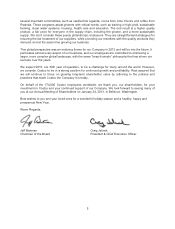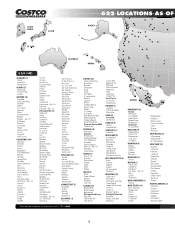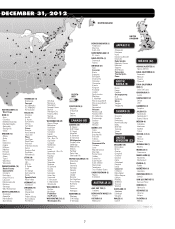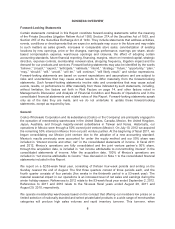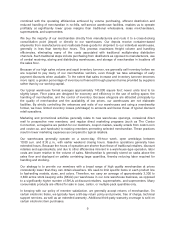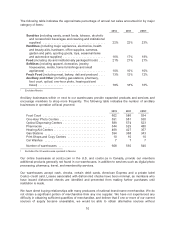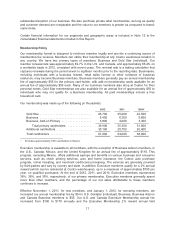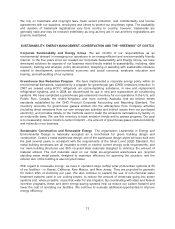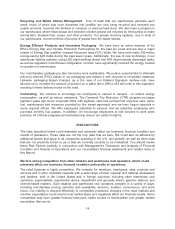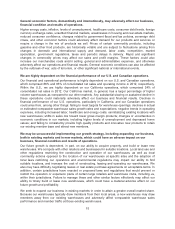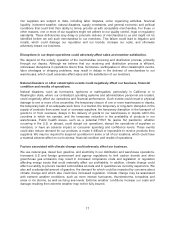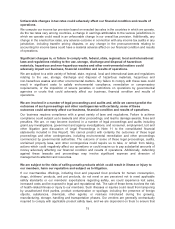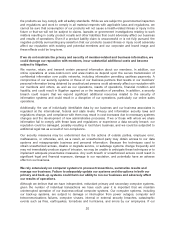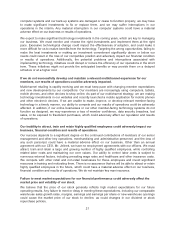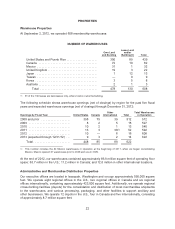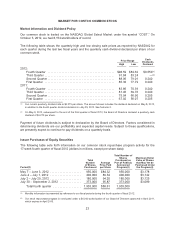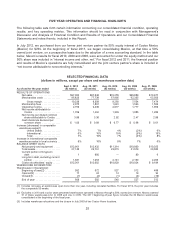Costco 2012 Annual Report Download - page 17
Download and view the complete annual report
Please find page 17 of the 2012 Costco annual report below. You can navigate through the pages in the report by either clicking on the pages listed below, or by using the keyword search tool below to find specific information within the annual report.General economic factors, domestically and internationally, may adversely affect our business,
financial condition and results of operations.
Higher energy costs, inflation, levels of unemployment, healthcare costs, consumer debt levels, foreign
currency exchange rates, unsettled financial markets, weaknesses in housing and real estate markets,
reduced consumer confidence, changes related to government fiscal and tax policies, sovereign debt
crises, and other economic factors could adversely affect demand for our products and services or
require a change in the mix of products we sell. Prices of certain commodity products, including
gasoline and other food products, are historically volatile and are subject to fluctuations arising from
changes in domestic and international supply and demand, labor costs, competition, market
speculation, government regulations, taxes and periodic delays in delivery. Rapid and significant
changes in commodity prices may affect our sales and profit margins. These factors could also
increase our merchandise costs and/or selling, general and administrative expenses, and otherwise
adversely affect our operations and financial results. General economic conditions can also be affected
by the outbreak of war, acts of terrorism, or other significant national or international events.
We are highly dependent on the financial performance of our U.S. and Canadian operations.
Our financial and operational performance is highly dependent on our U.S. and Canadian operations,
which comprised 88% and 83% of consolidated net sales and operating income in 2012, respectively.
Within the U.S., we are highly dependent on our California operations, which comprised 24% of
consolidated net sales in 2012. Our California market, in general, has a larger percentage of higher
volume warehouses as compared to our other markets. Any substantial slowing or sustained decline in
these operations could materially adversely affect our business and financial results. Declines in
financial performance of our U.S. operations, particularly in California, and our Canadian operations
could arise from, among other things: failing to meet targets for warehouse openings; declines in actual
or estimated comparable warehouse sales growth rates and expectations; negative trends in operating
expenses, including increased labor, healthcare and energy costs; cannibalizing existing locations with
new warehouses; shifts in sales mix toward lower gross margin products; changes or uncertainties in
economic conditions in our markets, including higher levels of unemployment and depressed home
values; and failing to consistently provide high quality products and innovative new products to retain
our existing member base and attract new members.
We may be unsuccessful implementing our growth strategy, including expanding our business,
both in existing markets and in new markets, which could have an adverse impact on our
business, financial condition and results of operations.
Our future growth is dependent, in part, on our ability to acquire property, and build or lease new
warehouses. We compete with other retailers and businesses for suitable locations. Local land use and
other regulations restricting the construction and operation of our warehouses, as well as local
community actions opposed to the location of our warehouses at specific sites and the adoption of
local laws restricting our operations and environmental regulations may impact our ability to find
suitable locations, and increase the cost of constructing, leasing and operating our warehouses. We
also may have difficulty negotiating leases or real estate purchase agreements on acceptable terms. In
addition, certain jurisdictions have enacted or proposed laws and regulations that would prevent or
restrict the operation or expansion plans of certain large retailers and warehouse clubs, including us,
within their jurisdictions. Failure to manage these and other similar factors effectively may affect our
ability to timely build or lease new warehouses, which could have a material adverse affect on our
future growth and profitability.
We seek to expand our business in existing markets in order to attain a greater overall market share.
Because our warehouses typically draw members from their local areas, a new warehouse may draw
members away from our existing warehouses and adversely affect comparable warehouse sales
performance and member traffic at those existing warehouses.
15


